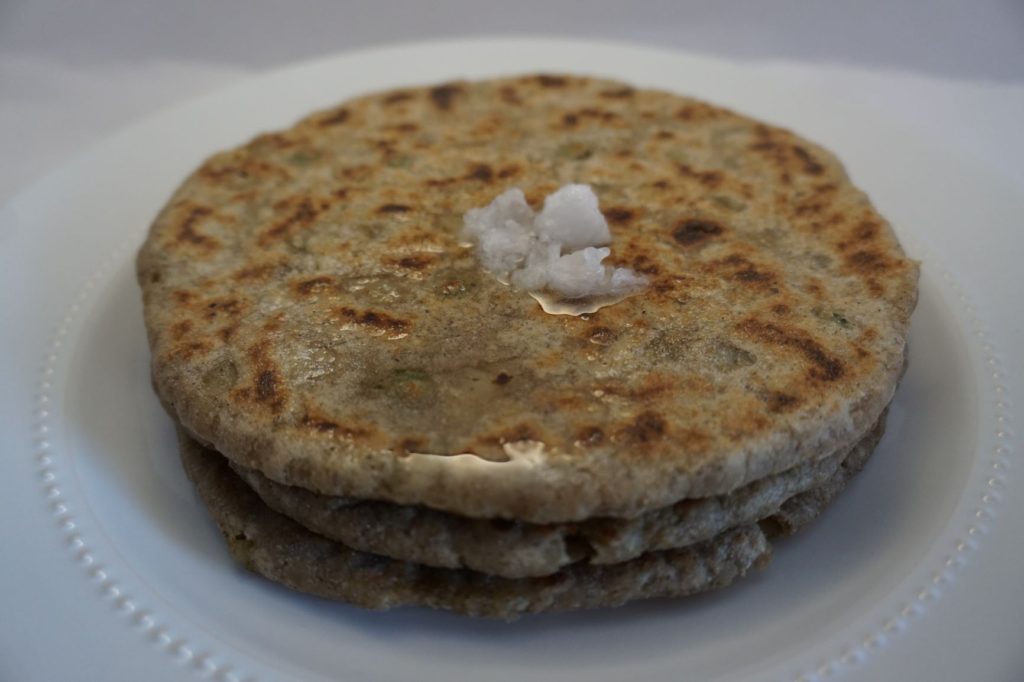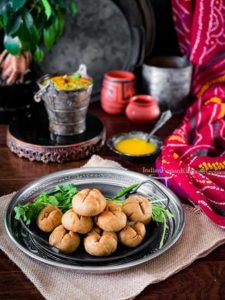A simple traditional North Indian recipe of potato or aloo paratha that you can now enjoy without the gluten 😊
Yield: 3 – 4 parathas
Prep time: 15 minutes
Resting time: 15-20 minutes
Cook time: 20 minutes
Total time: 30 – 35 minutes
Ingredients
Dough
- 1 ½ cup of Metta flour
- ¾ cup water at room temperature*
- ¼ tsp of salt
- ¼ tsp baking soda
- ½ tsp lime or lemon juice (to activate the soda for extra softness and fluffiness)
- ¼ cup of dry Metta flour (for dusting and sprinkling)
- (optional, but recommended) 1 tablespoon of oil or ghee or butter to pan-fry the parathas while cooking
Stuffing
- 1 ½ cup mashed potatoes (dry NOT wet)
- 2 Tbsp fresh finely chopped cilantro
- ½ tsp fresh grated ginger
- 1 tsp carom seeds or Ajwain (sub thyme)
- 1 tsp salt
- ¼ tsp chili powder (sub cayenne pepper)
Tools Needed
- Rolling pin
- Skillet (preferably hard anodized pan)
- Flat spatula
Instructions
- For the Dough, in an open wide bowl, stir together the flour, salt, baking soda, lime/lemon juice, and water (yogurt if preferred). Mix and knead until the dough starts to pull away from the sides. Mix and knead well. (I knead the dough in an electric mixer for about 5 minutes using the dough hook so it is kneaded to perfection without tiring the arms.) The dough should not be sticky nor wet. It should be pliable.
- Once a soft yet firm dough is achieved, put it in a container with a cover to avoid developing dry skin on it. For best results, leave it in the fridge for at least 15-20 minutes. For best results, use dough within 48 hours of initial kneading.
- For the Stuffing, place all filling ingredients in a bowl and mix to combine.
- Preheat skillet, or tawa, to medium-high heat.
- Smear a little dry flour on your hands before making the dough balls to prevent the dough from sticking to your hands. Divide the dough into 3 to 4 balls.
- When ready to roll, dip each dough ball in its entirety into dry flour to avoid sticking to the rolling pin. Place it on a clean counter top, or chokki, to roll using a rolling pin.
- Roll evenly applying gentle pressure into a round about 4” in diameter (if it starts breaking or sticking to the counter or rolling pin, you may be pressing too hard).
- Place ¼ cup of the filling into the middle of the rolled out dough.
- Using gentle hands, gather the edges of the dough to enclose the filling.
- Flatten the ball slightly and shape the flattened disc into a circle using your hands.
- Dust the dry flour on both sides of the disc or you can dip the disc into the dry flour and spread the dry flour with your hands evenly on both sides of the disc. Keeping the “sealed” side facing up, continue to use a rolling pin to roll it out to about ¼ – ⅓” thickness. Don’t worry if the insides of the paratha breaks a little in some spots when rolling as long as the edges don’t break off.
- Using your hands gently place the paratha on the skillet. Let it cook for 45 seconds to a minute. Flip it using a flat spatula and spread 1 tsp of oil or ghee on the top side that is slightly browned. Let it cook for another 1 minute. Flip it again. Spread 1 tsp of oil on the top unoiled side. Cook both sides to golden brown color. After fully cooked and off the stove, if you want you can put a little more ghee or butter for extra rich taste.
- Repeat the process for the rest of the parathas. Best eaten fresh!
Please Note: If you are new to making flatbreads/tortillas, please be patient with yourself and the dough, it takes time and some practice to get the hang of it!
If making a bunch of them at once, it is best to stack them in a foil, a tortilla warmer or in another container wrapped in a cloth. This will keep them warm and soft for hours.
If any left over, save them in a foil or zip lock bag over night on the counter and eat them the next day after warming in a zip lock bag or a tortilla warmer for 25-30 seconds in the microwave. You can also store them in the refrigerator in a tightly sealed bag and consume within 2-3 days. They may harden in the refrigerator, because they are made without any preservatives, but warming them in the microwave or on a hot (at least 500 F) skillet will make them soft again.
Have you used Metta gluten-free flour for this recipe or any other recipe?
Kindly take a moment to leave a review here to help our community!
Any questions or concerns or ideas on how to improve our recipe and/or process, please feel free to contact us at mettagfatta@gmail.com











